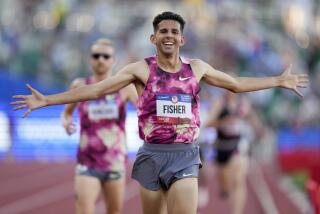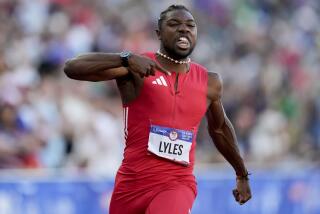Boston Marathon Records Could Go Out the Window
BOSTON — The window could be open, which means the weather would make you close yours, and if you listen to the runners setting sail in the Boston Marathon today, you would think the America’s Cup was in town.
Temperatures are in the 40s, and if the wind is blowing briskly from the west, they say, records are in jeopardy.
Not just race records, world records.
“A world record can be set in this race,” said Amby Burfoot, the 1968 winner, “but the window of opportunity is narrow. You have to have conditions that are just right.”
Weather, field, pace. To go faster than the 2 hours 6 minutes 50 seconds that Belaine Densimo of Ethiopia ran on a flat Rotterdam course in 1988, and to become the third man to win this race three times in a row, Cosmas Ndeti would have to average 4 minutes 50 seconds a mile for 26.2 miles.
No problem.
“To set a world record puts you on the map,” said Ndeti, whose place on the map is Machakos, about 40 miles from Nairobi, Kenya. “Everyone here wants to be a world record-holder.
“I can set a world record, why not? It all depends on how the guys are going to run. We’ll wait and see.”
That’s his game, waiting for half of the race, then having everyone see him out front. He played it in 1993 and ‘94, when he set a race record, only 25 seconds off the world mark. In both he ran “negative splits,” meaning the second 13 miles was covered faster than the first. Nobody else has done that in winning Boston.
Uta Pippig is No. 1 in the world, and the women’s record, 2:21:06 set by Norway’s Ingrid Kristiansen at London in 1985, is in her sights.
There is magic in running a time that begins “2:20” for the women. “I hope I can do it first,” Pippig said. “I have that dream, to run 2:20 and under, but I’m not so crazy to say I can do it this year.”
Others are. “I think that there is a better chance of a women’s record than a men’s record in this race,” said Joan Benoit Samuelson, who holds the U.S. women’s record, 2:21:21, set at Chicago in 1985, and who held the Boston mark until Pippig obliterated it by 58 seconds while winning in 2:21:45 last year.
The reason for Benoit’s optimism is a deep women’s field that will push Pippig and take charge if she falters.
Valentina Yegorova, the 1992 Barcelona Olympic gold medalist from Russia, is here again after finishing second by 1:48 to Pippig last year. Elana Meyer of South Africa gets much of the credit for Pippig’s record, running with her for 30 kilometers. She may be able to stay with her longer this time.
An intriguing factor is Tegla Loroupe, who won at New York last year with a time of 2:27:37 in her first marathon. An effervescent, vibrant 21-year-old, she became a big hit there and was an even bigger hit in her native Kenya, where her victory was rewarded with nine cows and 16 sheep for her family.
If she wins today, she’ll be able to buy $75,000 worth of cattle, and, with a course record, $25,000 worth of sheep. A world mark brings $50,000, providing enough livestock feed in Kenya for a long time.
Ndeti has found that out. In a country where the average per capita income is at poverty level, he has two chauffeurs and a gardener and is building a house for his mother, one of his father’s three wives, who produced 37 children.
Some have questioned whether the sudden wealth--two years ago, Ndeti was a postal worker, and now “I am one of the richest men in Kenya,” he said--has softened his regimen.
Everywhere he goes, Ndeti faces doubts, fortified by his failure in the Chicago Marathon last year and, more recently, in a half-marathon at Lisbon.
He dropped out at 20 miles in Chicago and was 49th in Lisbon, where his 1:08:14 was only seven seconds faster than the women’s winner, Loroupe.
Each time he said a physical problem had hampered him, and he admits that he has not trained as hard for this year’s Boston Marathon, citing a problem with his left thigh.
“Everybody is targeting on me,” he said. “Everybody is watching me. To me I don’t mind, because. . . . I like to be famous.”
He is the leader of a 17-man contingent from Kenya, and they are all targets because Kenyans have won this race four years in a row.
Attacking them will be Kim Jae-Ryong, who was second to Ndeti by 10 seconds in 1993, and Kim Wan-ki of South Korea, who will probably run together; a five-runner Mexican contingent, led by Isidro Rico of Mexico City, who flatly says he can beat Ndeti; and Lucketz Swartbooi of Namibia, who trains in Utah with 1993 Los Angeles Marathon rabbit/winner Paul Pilkington.
A men’s world record? Maybe, if Ndeti’s magic in Boston holds--”it has changed my life,” he said--or if the South Koreans get hot.
A women’s record? More likely, and most likely from Pippig, who won a half-marathon in Japan last month by five minutes in 1:07:59.
“The day shall come if I train real well and I really put everything in to reach this goal,” she said. “I train for this, of course. I shouldn’t say it, but I’m so close now to this time.
“In 10 years, maybe 10 women can run (2:20). Maybe it’s more spectacular to win Boston again.”
And even more spectacular to win it with a world record.
More to Read
Sign up for The Wild
We’ll help you find the best places to hike, bike and run, as well as the perfect silent spots for meditation and yoga.
You may occasionally receive promotional content from the Los Angeles Times.






